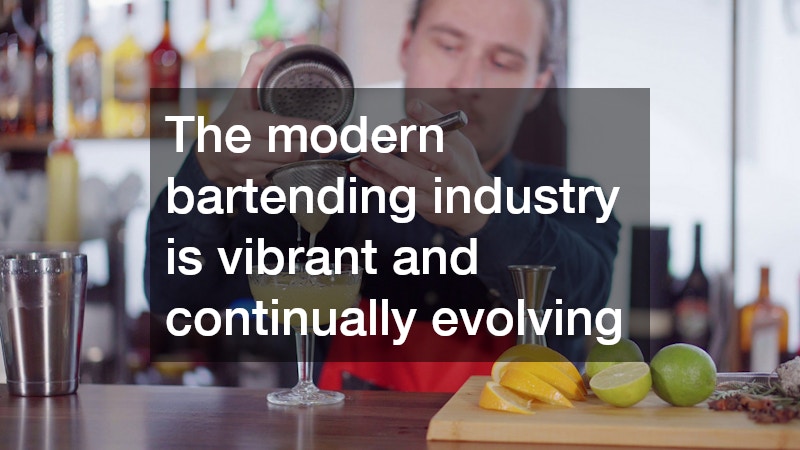The bartending industry is undergoing a significant transformation, driven by consumers’ evolving expectations and preferences. As bars and restaurants strive to offer exceptional experiences, it is crucial for bartenders to continuously enhance their skills and knowledge. This is where alcohol training comes into play, becoming a pivotal component in shaping professional bartenders who can cater to a diverse clientele. This shift also reflects the growing recognition of bartenders as artisans and customer service professionals, rather than simply drink servers. Today’s guests are looking for authenticity, creativity, and expertise in every pour, making ongoing learning an essential part of staying relevant and competitive in the marketplace.
The Importance of Comprehensive Skills Development
Comprehensive bartender education equips professionals with the necessary skills to excel in a dynamic environment. It covers a wide range of topics, including the history of spirits, the art of mixology, and the science behind perfecting cocktails. By understanding these elements, bartenders can craft signature drinks that not only taste great but also provide patrons with memorable experiences.
Moreover, advanced training helps bartenders develop a deep understanding of flavor profiles, enabling them to pair drinks with various dishes effectively. This knowledge is a crucial asset in today’s competitive market, where guests demand not just a drink, but a complete gastronomic adventure. The ability to recommend beverages that complement meals enhances the overall dining experience, encouraging repeat patronage.
This level of expertise also empowers bartenders to make informed decisions about the best spirits and mixers to use, considering factors such as quality and cost-effectiveness. This proficiency helps bars and restaurants maintain profitability while delivering high-quality service.
Enhancing Customer Interaction Through Professional Training
Industry education goes beyond technical skills, emphasizing the importance of effective customer interaction. Bartenders are often the first point of contact in bars and restaurants, and their ability to communicate and engage with patrons sets the tone for the entire experience. With proper preparation, bartenders learn how to read cues and adapt their service to accommodate different customer preferences.
Furthermore, training often includes conflict resolution techniques, which are invaluable in managing situations where guests might become unruly. By preparing bartenders to handle such scenarios calmly and professionally, establishments can ensure a pleasant environment for all guests. This level of preparedness reflects positively on the venue’s reputation and often results in positive word-of-mouth marketing.
Customer interaction also fosters loyalty; trained bartenders can create connections, turning occasional visitors into regulars. The warmth and personalized service patrons receive encourage them to return, ultimately boosting sales and helping to build a strong, loyal customer base over time.
Professional Growth and Career Advancement
In the modern bartending industry, specialized instruction serves as a valuable pathway for career advancement. Bartenders who invest in expanding their skill set often find themselves in high demand, with opportunities to work in prestigious establishments worldwide. As the industry continues to evolve, employers increasingly seek professionals who can elevate their offerings and maintain a competitive edge.
Advanced skills open doors to a variety of roles within the hospitality sector, such as head bartenders, bar managers, and beverage directors. These positions come with increased responsibilities and compensation, appealing to ambitious individuals seeking long-term career growth.
Additionally, ongoing education keeps professionals up-to-date with industry trends and new techniques. The ability to stay ahead of the curve not only enhances personal career prospects but also contributes to the overall evolution of the bartending industry. For many, this continuous growth is part of the appeal, offering new challenges and creative opportunities at every stage.
Promoting Responsible Drinking Practices
One of the most critical aspects of bartender education is the promotion of responsible drinking. This includes understanding the effects of alcohol consumption and how to identify signs of intoxication. By recognizing these signs, bartenders can take proactive measures to prevent over-serving, ensuring a safe environment for guests.
Moreover, responsible service training includes teaching bartenders how to craft lower-alcohol cocktails and offer non-alcoholic alternatives for patrons who prefer them. This approach caters to a broader audience while promoting healthier consumption practices.
Finally, understanding the legal and ethical responsibilities that come with serving alcohol helps establishments avoid legal issues, protecting their reputation and license to operate.
Elevating the Bartending Profession
The modern bartending industry is vibrant and continually evolving, responding to the ever-changing demands of its patrons. In this landscape, alcohol training emerges as a vital tool, equipping bartenders with the skills and knowledge necessary to excel. By investing in comprehensive programs, establishments not only enhance service quality but also promote responsible drinking and open doors to career advancement.
As bars and restaurants raise the bar in customer service and product offerings, well-trained bartenders stand at the forefront, ensuring that each patron’s experience is memorable and satisfying. Ultimately, these programs not only shape skilled professionals but also contribute to a safer, more dynamic, and progressive industry. With its transformative impact, alcohol training truly raises the bar in modern bartending.








